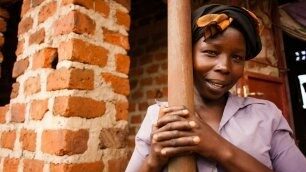Empowering Women by Making the Law Work for Them

By Ed Wilson, Executive Director
In 1995, Beijing hosted the Fourth World Conference on Women. The conference produced the Beijing Declaration and Platform for Action, calling for change on 12 critical areas of concern, including unequal access to education and training, unequal access to health care, and violence against women. Twenty years later, much has been achieved but much more needs to be done. That’s why the theme of this year’s International Women’s Day is the slogan of UN Women’s "Beijing+20” campaign-- "Empowering Women, Empowering Humanity: Picture it!”
Empowered women make things happen. I think of my mother—when she grew weary of putting out pots in the attic of our farmhouse to collect the rain water that came through the leaky roof she took things into her own hands and got a second job waiting on tables at a local restaurant. It caused disruption in the family but she made it happen. Grace, a 27-year old mother of five children and a client of IJM in Uganda, became a victim of property grabbing after the death of her husband. Her brother-in-law drove her out of her home and off the small plot of land she cultivated. Without land, Grace could not farm to feed her children. Desperate to get her property back and determined to make something happen, Grace decided to walk 40 kilometres to the government office in Kampala that oversees land ownership. She would answer questions and fill out paperwork, but the government officials always had more questions, and Grace always needed to come back.
Two women, separated in culture and opportunity by a vast expanse but united in their determination to provide a safe and secure future for their children. My mother got her new roof but Grace was losing hope until IJM’s Ugandan lawyers and investigators came alongside her. They worked with her for six months to build a case that resulted in Grace’s brother-in-law voluntarily transferring the land back to Grace. Then they worked with Grace for two more years to ensure that she had an official title to the property in her own name to keep her protected for good.

Grace’s situation is shared by millions of rural women in developing nations. In sub-Saharan Africa, 80 percent of the food production is performed by women, but almost none of the land under cultivation is owned by women. Though Uganda has robust laws setting forth the rights of women and children and criminalizing the actions that comprise property grabbing, in practice, many widows and orphans often do not experience these protections. Several studies, including one conducted by IJM in 2013, estimate that 30-35% of widows in the country have been victims of property grabbing in their lifetime.
In Uganda and other sub-Saharan countries, many of the critical areas of concern identified by the Beijing conference are interdependent for women. Many of the widows being chased from their own homes suffer from the same HIV that killed their husbands. Far too often, as Gary Haugen says in The Locust Effect, "after being violently chased from her property, a widow is forced to resettle in a location that makes it virtually impossible for her to access the critical health care she needs to combat her own HIV.” In other cases, the loss of the marital home forces the widow into prostitution to support herself and her children, increasing the risk of contracting the disease.
IJM has been investigating cases of property grabbing affecting widows in Uganda since the early 2000s, and during that time has collaborated with local authorities to return more than 1000 property grabbing victims to their land. While Grace’s case was resolved by alternative dispute resolution, IJM has seen that ADR does almost nothing to deter other potential perpetrators from engaging in similar behavior. As a result, IJM invests time and resources in equipping police to pursue criminal prosecutions and prevent land grabbing altogether, as well as working to improve the administration of estates in keeping with Uganda’s inheritance and land rights laws.

The Beijing Declaration and Platform for Action states that "Violence against women is an obstacle to the achievement of the objectives of equality, development and peace.” When women and girls are protected from violence by the enactment and enforcement of just and equitable laws and policies, the empowermentprovided by equal access to education and training, equal access to health care, equal pay for equal work, and other priorities will achieve the desired effects for women and girls. Restored to her property, and secure in a new brick home she built with her own hands, Grace is once again able to support her five children with the income she generates from the sale of vegetables she grows on the land. Once the law went to work for her, Grace was able to make it happen.